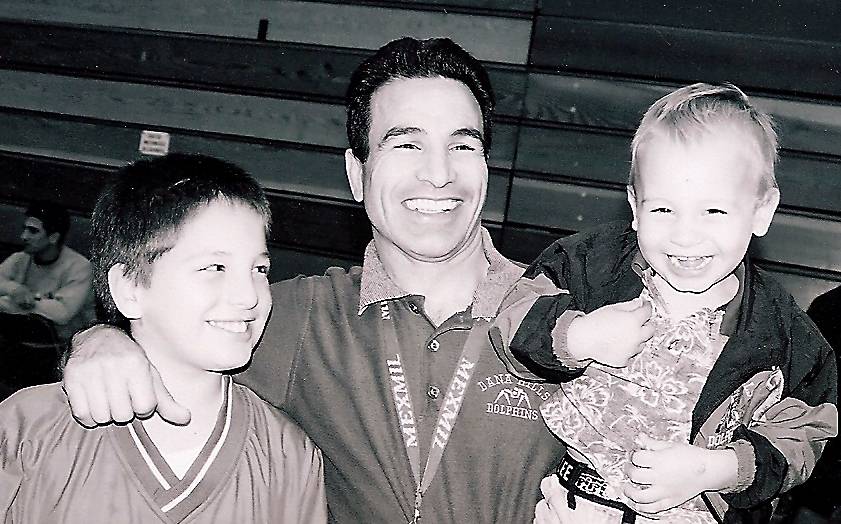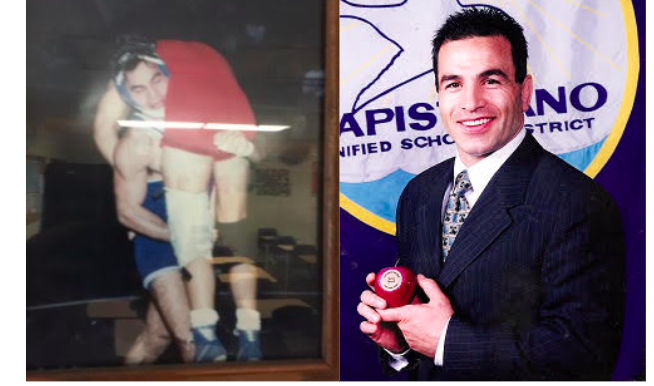My journey into all things Iranian began sitting next to Reza Abedi at a Little League game in 2004. Reza and I taught at the same high school and since our sons played together, we found ourselves having a casual conversation on a lovely Spring Saturday.
A conversation that would change my life.
Reza shared with me that he “ran to third base” the first time he hit a baseball. After we had a good natured laugh, Reza began to share his story. What I did not understand at the time was that I, too, couldn’t find my way to first base.
My absolute ignorance regarding Iranian identity, culture, history and politics sent me running to third. As Reza told his story to me, I knew I had to share it. And not just his journey, but my own.
Reza, one of 10 children born in Kermanshah in 1960, survived The 1979 Revolution, The Iran-Iraq War and made international news when he defected during the World Wrestling Tournament in 1982.
Then there’s my story–a girl from white-picket fence America in a household of 2.2 children, gold shag carpet and a station wagon. Reza’s story had to be told, not only for Reza, but also for the millions of Americans who are just like me–who are running to third base. For whom, Iran has been banished to the 1979 shadows of blindfolded hostages and flaming American flags.
The heart in Reza’s narrative connects humanity. The author’s perspective makes meaning of its place in history.
We invite you to review the first chapter of our nonfiction narrative American Wings, Iranian Roots included below. Additionally, we have included links to our Facebook Page and educational Google Site. The book is available in Audible, print and KDP select on Amazon.
We share your commitment to art and the importance of storytelling and hope our story can contribute to the cause.

CHAPTER ONE
SPRING 2004
ORANGE COUNTY, CALIFORNIA
“The first time I hit a baseball I ran to third base.”
“Third base?” I ask.
“Why’d you run to third base?”
Munching sunflower seeds and watching our sons play Little League, Reza and I sit in our lawn chairs on a sunny Saturday afternoon. Since we teach at the same high school, we have been chatting casually about colleagues and other mundane topics.
“No one told me,” he says between spits, “to run to first.”
“You must have been little.”
“Not really,” he answers. “I was in college.”
He offers me another helping from the torn corner of his plastic bag. I put out my hand and study his face. With his kind, dark eyes and a model-perfect smile, he pours the silver seeds into my palm.
I raise my eyebrows. “No baseball in Iran?”
“No baseball in Iran,” he says with a laugh. “Soccer, gymnastics and wrestling.”
I recall Reza sharing his World Military Wrestling Champion gold medal at a student assembly. Although he is short, his toned body pulses with the strength of an elite athlete.
“Watch me coach,” he says. “Wrestling tournament is next week. Come see a real man’s game.”
Just as I’m about to defend all American sports, a dad from another team comes to me with a newspaper article in his hand. “Are you Kristin Orloff?” he asks.
“Yes, I am.” I glance at the article. “Is that the article I wrote about ‘fun’ in little league?”
“It is.” He hands it to me. “Could you sign it?”
“Be glad to.”
I hear Reza clear his throat. “You liked it that much?”
The dad nods. “It gave me a completely new perspective.”
He walks away and I turn to Reza, planning my defense of America’s favorite pastime. But before I can begin, he looks to his feet and rubs his hands together. Like a little boy.
“Hey, ah, Kristin,” he says, using a soft tone I hadn’t heard before. “Maybe one day you could write my story.”
“Yeah, maybe.”
The following week I enter our high school gym to watch our wrestling team. The bleachers are packed with screaming students and cheering parents. I am grateful to squeeze in next to a colleague.
“What do I need to know?” I ask as I pull open a package of red vines. “I promised Reza I’d come watch him coach.”
He laughs at my ignorance. “A match is three periods of two minutes each. But if you pin a guy, it’s over.”
“That doesn’t sound too bad,” I say, tugging on the stale vine with my teeth. “Most sports take hours.”
“You’re wrong,” he says. “Wrestling demands more strength, speed, discipline and . . .” He searches for a word. “Just guts than any sport.”
“Looks like they’re just rolling around.”
“Don’t let Reza hear you say that,” he says. “He credits wrestling with saving his life.”
I watch Reza pace about the match, his compact build moving with large gestures to match his exploding voice.
“Was Reza’s life in danger?” I ask, trying to remember if Reza had mentioned anything like that during our conversations.
My colleague looks into the faces of those sitting around us. He leans into me. “You know about Reza, right?”
“Know?” I ask, my mind flying back to his words at the Little League game. Maybe someday you can write my story.
“He was an assassin for the Shah during the revolution. He had to escape without paperwork so no one knows his real age.”
“Seriously?” The red vine snaps in mid-bite.
“Had to kill a man with his bare hands.” His fists mimic twisting a rope. “Snapped his neck like a turkey bone.”
“He told you this?”
“I’ve heard things.”
A voice bounces across the gym announcing Reza’s son as the next competitor. The crowd bursts into wild cheers as his son jogs into the center circle.
It is a grueling match. At times, Reza crawls around the perimeter to shout his guttural commands. His son struggles with his opponent. Again and again, their bodies slam to the mat.
“Pin him!” I say, not really knowing any other term to use. The two wrestlers snarl as their limbs twist in positions that seem to rip them from the sockets. Reza continues his verbal barrage, his flying spit matching the sweat pouring from the young athletes.
As I watch him, I wonder what he endured to come here, to live this moment, to coach his son in an American high school gym.
The referee raises his son’s hand in victory. Reza pumps his fist.
After all the matches are over and the fans began to clunk down the bleachers, I approach Reza.
“That was pretty exciting,” I say.
With a grin, he embraces me. “Thanks for coming.”
“Your son did well.”
Reza nods. A few parents come to shake his hand, and various wrestlers pepper him with questions about tomorrow’s practice or if he knows where they’ve left their shoes. His humble and patient manner intrigues me. I remember the words, “snapped his neck like a turkey bone.” I look at Reza’s hands and wonder.
“Remember when we talked about writing your story?”
“Of course,” he says.
“Still up for it?”
He places his hand on my shoulder. “Can you come over tomorrow?”
I walk to the parking lot with a bit of a bounce in my step. This is going to be exciting. An assassin for the Shah. I’m a little nervous about taking on my first book project, but I have published several articles. How hard could a book be?
The next night, I leave Reza’s house with my spiral notebook, three hours of videotape and no idea how I am going to write his story. Do I begin with the night he tried to escape? How am I going to keep his ten siblings straight? Should I include the vignettes that might jeopardize our safety?
The cursor at the top of the blank page mocks me. I scan my notes again. Consult my writing books. Watch another section of tape. All right, then, I’ll just begin with the first experience he shared with me. I’m sure it will flow from there.
More information can be found on:
https://www.facebook.com/RezaAbediWrestler/
https://sites.google.com/view/iranian-research







